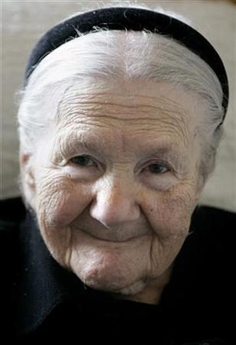Polish Holocaust hero dies at age 98
(Agencies)
Updated: 2008-05-13 10:02
Updated: 2008-05-13 10:02
WARSAW - Irena Sendler - credited with saving some 2,500 Jewish children from the Nazi Holocaust by smuggling them out of the Warsaw Ghetto, some of them in baskets - died Monday, her family said. She was 98.
 Nobel Peace Prize nominee Irena Sendler poses at her home in central Warsaw, March 14, 2007. [Agencies] |
Sendler, among the first to be honored by Israel's Yad Vashem Holocaust memorial as a Righteous Among Nations for her wartime heroism, died at a Warsaw hospital, daughter Janina Zgrzembska told The Associated Press.
President Lech Kaczynski expressed "great regret" over Sendler's death, calling her "extremely brave" and "an exceptional person." In recent years, Kaczynski had spearheaded a campaign to put Sendler's name forward as a candidate for the Nobel Peace Prize.
Sendler was a 29-year-old social worker with the city's welfare department when Germany invaded Poland in September 1939, launching World War II. Warsaw's Jews were forced into a walled-off ghetto.
Seeking to save the ghetto's children, Sendler masterminded risky rescue operations. Under the pretext of inspecting sanitary conditions during a typhoid outbreak, she and her assistants ventured inside the ghetto - and smuggled out babies and small children in ambulances and in trams, sometimes wrapped up as packages.
Teenagers escaped by joining teams of workers forced to labor outside the ghetto. They were placed in families, orphanages, hospitals or convents.
Records show that Sendler's team of about 20 people saved nearly 2,500 children from the Warsaw Ghetto between October 1940 and its final liquidation in April 1943, when the Nazis burned the ghetto, shooting the residents or sending them to death camps.
"Every child saved with my help and the help of all the wonderful secret messengers, who today are no longer living, is the justification of my existence on this earth, and not a title to glory," Sendler said in 2007 in a letter to the Polish Senate after lawmakers honored her efforts in 2007.
In hopes of one day uniting the children with their families - most of whom perished in the Nazis' death camps - Sendler wrote the children's real names on slips of paper that she kept at home.
When German police came to arrest her in 1943, an assistant managed to hide the slips, which Sendler later buried in a jar under an apple tree in an associate's yard. Some 2,500 names were recorded.
"It took a true miracle to save a Jewish child," Elzbieta Ficowska, who was saved by Sendler's team as a baby in 1942, recalled in an AP interview in 2007. "Mrs. Sendler saved not only us, but also our children and grandchildren and the generations to come."
Anyone caught helping Jews in Nazi-occupied Poland risked being summarily shot, along with family members - a fate Sendler only barely escaped herself after the 1943 raid by the Gestapo.
|
||
|
||
|
|
|
|

